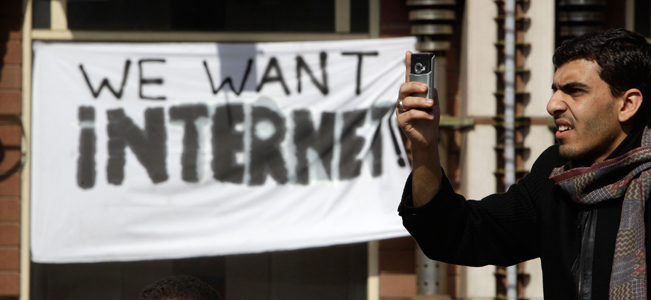When President Mubarak departed, Egypt’s Internet whirled back to life to the appla use of millions around the world. While this is an obvious triumph, the fact that it was shut down at all has caused a sense of alarm around the world, especially in America. Can that happen here? Can we all be cut off from the Internet?
use of millions around the world. While this is an obvious triumph, the fact that it was shut down at all has caused a sense of alarm around the world, especially in America. Can that happen here? Can we all be cut off from the Internet?
The short answer is ‘no’ and ‘yes’.
Why ‘no’? Even though the American government does exercise some regulations over the Internet, it does not own the Internet or any means by which people get to the Internet. And, under existing law, our government doesn’t have the right to turn it off as much as there is an effort to gain that right through newly introduced legislation. But let’s assume our government did have the right, it actually doesn’t have the technical ability. Our Internet is immense: thousands of providers, millions of miles of cables, countless portals. There is no single “hub” someone can go to in order to flip the switch into the off position.
So then, why ‘yes’? Our government can engage in what I call “forced voluntary cooperation.” While there are no kill the Internet laws on the books yet giving our government total control over or ownership of our Internet, the government certainly has ways to “persuade” providers and carriers to shut off access “on their own.” Simply put, voluntarily do what I say or the ramifications will be so drastic you will regret it. That said, keep in mind that if our government has come to a point where it is engaging in forced voluntary cooperation, then as a nation-state we are no doubt facing the gravest threat to our safety and security. As a citizens first and businesses second, it behooves all of us to voluntarily cooperate, forced or not. We as Americans would want to stand together and stand behind our government to protect our country and our fellow Americans.
There would be tremendous side-effects, however. The cost to shut down the American web would be severely high, not to mention the billions in lost revenue for businesses at home and abroad. Our Internet is, unlike China’s, is a truly international system, feeding and being fed by innumerable places all over the world.
Countries that have pre-built limitations into the foundations of their Internet have power over their citizens that Americans would not want our government to have – the power to unilaterally control freedom of speech. Countries such as Iran and China have restrictive laws and filters in place already — imagine Net Nanny on steroids working for an entire country. Bahrain making news with protests, is suspected of restricting site access as well. International content is intensely censored or, in some cases, not allowed all together. In China, searches for information on Tibetan independence are completely blocked. In Iran and Egypt, there are fewer than a dozen portals allowing information in. Carriers number in the dozens, not the thousands, some of which are state owned. Shutting down an operation that is mostly state owned and closed circuit is a much less daunting task than killing an Internet built on the fundamental notions of freedom.
So, rest assured fellow browsers, the likelihood that we’ll ever see our government kill the Internet is basically non-existent.

Follow me